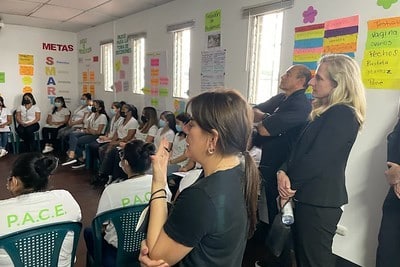
A bipartisan congressional delegation visited Central America this week to learn more about the Biden administration’s actions to stem irregular migration to the United States.
In both El Salvador and Guatemala, the delegation, which included Reps. Abigail Spanberger (D-VA-07), Lou Correa (D-CA-46), John Katko (R-NY-24), Jimmy Panetta (D-CA-20), and Tony Gonzales (R-TX-23), met with civil society leaders and business leaders to discuss their work, the impact of irregular immigration on their societies and economies, the challenges they face in trying to build opportunities and mitigate the root motivations for migration, and how the U.S. government can support these efforts — both at home and through international engagement.
The delegation also met with U.S. Foreign Service, U.S. Department of Commerce, and U.S. Agency for International Development officers in both countries to discuss their work implementing the Biden Administration’s root causes of migration strategy.
“To better understand the challenges coming from Central America and how they impact the security of the United States, it’s important to meet directly with officials, business leaders, and law enforcement on the ground,” said Spanberger, a former federal law enforcement officer and CIA case officer who worked narcotics trafficking cases.
“This bipartisan delegation trip was an opportunity to learn more about how the United States can strengthen the information we have related to transnational criminal organizations, bring order to our southern border, and work in partnership with these countries to prevent further humanitarian crises in the region. I am grateful for the cooperation of the governments of Guatemala and El Salvador during this fact-finding mission, and I look forward to continuing my work in Congress related to the security of our borders and the long-term stability of our neighbors in Central America.”
In both countries, the delegation toured “near-shoring” facilities, including a technology company in El Salvador that runs training programs to create opportunities for Salvadorans at home as an alternative to migration and manufacturing facilities in Guatemala that leverage the strength of U.S. investment to create stable job opportunities.
In El Salvador, the delegation also visited the Joint Border Information Group (GCIF) headquarters. GCIF brings together law enforcement and immigration authorities from seven countries in the region — and Interpol — to share information about transnational criminal activities, particularly migrant smuggling and human trafficking.
In El Salvador, Foreign Minister Alexandra Hill Tinoco and Ambassador Milena Mayorga welcomed the CODEL for bilateral discussions at the Foreign Ministry about the economic, political, and social impact of migration on El Salvador.
In Guatemala, the delegation met with Guatemalan President Alejandro Giammattei, Ambassador Alfonso Quiñónez, and multiple cabinet members to similarly discuss the impact of migration on Guatemala’s economy and society.










